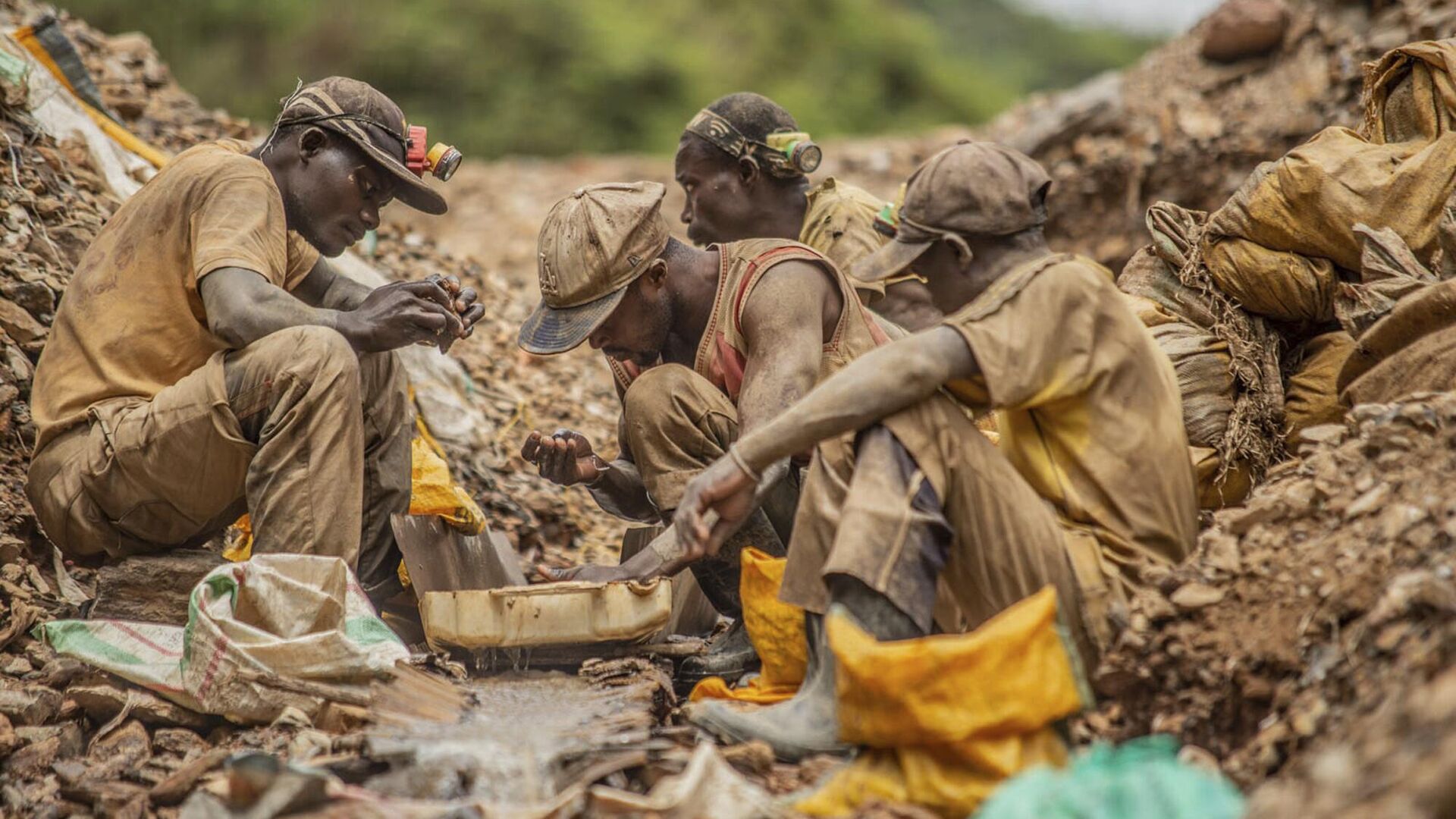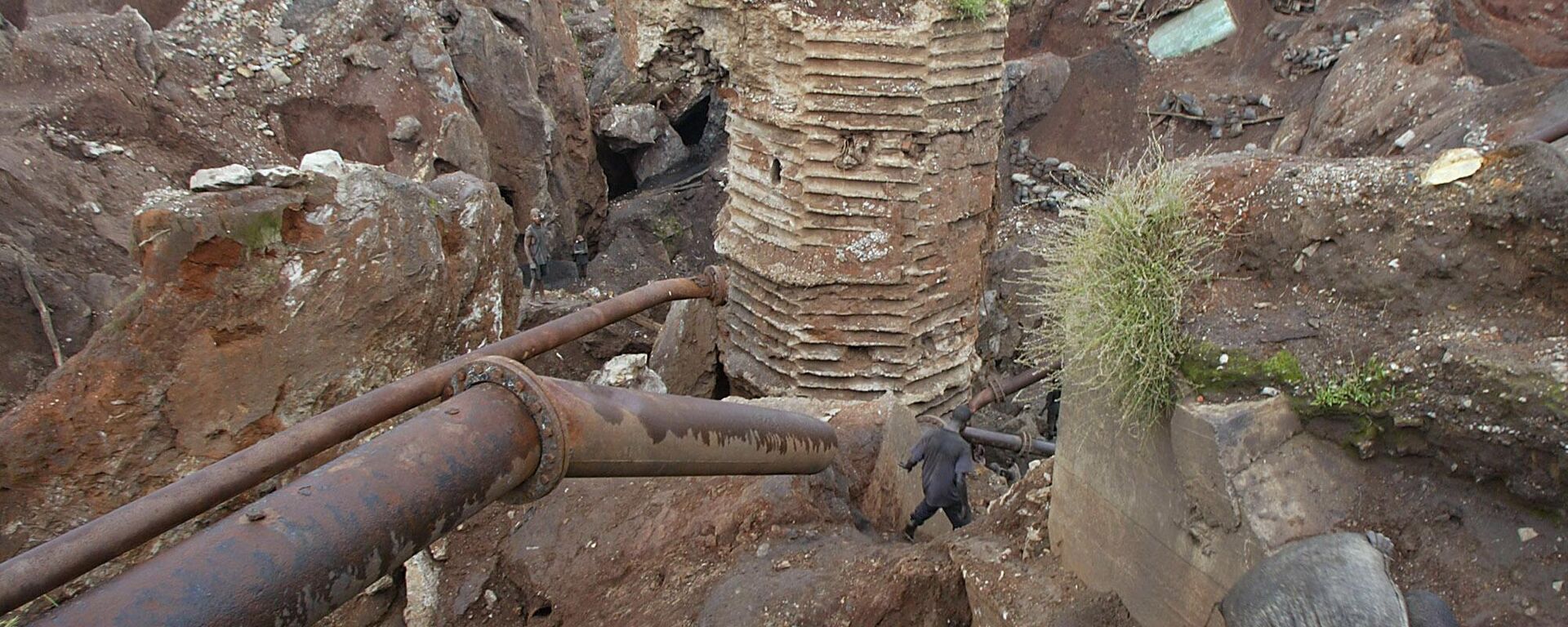https://en.sputniknews.africa/20240503/taking-more-and-leaving-less-expert-on-how-west-facilitates-illegal-mining-in-africa-1066356672.html
‘Taking More and Leaving Less’: Expert on How West Facilitates Illegal Mining in Africa
‘Taking More and Leaving Less’: Expert on How West Facilitates Illegal Mining in Africa
Sputnik Africa
In April, the Democratic Republic of Congo (DRC) accused the US technology giant Apple of using illegally mined minerals in the manufacture of its products... 03.05.2024, Sputnik Africa
2024-05-03T19:20+0200
2024-05-03T19:20+0200
2024-05-03T19:20+0200
opinion
africa insight
united states (us)
apple
international
democratic republic of the congo (drc)
world bank
sputnik africa
mining
minerals
https://cdn1.img.sputniknews.africa/img/07e8/02/1d/1065317946_0:105:2000:1230_1920x0_80_0_0_2b9f4d0cca1dabeba06d78f45ae56690.jpg
When African countries want to review their mining codes to get more benefits for themselves, the West and the World Bank in particular try to oppose it and promote systems that allow their companies to exploit the resources of African nations, Dr. Alex Mvuka Ntung, an independent research consultant who specializes in the Great Lakes Region of Africa, told Sputnik Africa.Ntung then gave a telling example: the DRC used to subsidize the mining sector by itself, getting annual profits of 600 million. However, now corporate firms financing the DRC's mining sector are reaping billions, but the DRC is gaining less due to new structures and investment regulations. What's more, some companies invest billions obtained as loans and don't pay taxes because they claim they are paying off the loans.However, according to Ntung, there are ways to counter this.What obligations do foreign mining companies have? The guest told Sputnik Africa that they are required to conduct regular due diligence in accordance with the Organisation for Economic Co-operation and Development's Due Diligence Guidelines for Responsible Supply Chains of Minerals from Conflict-Affected and High-Risk Areas. Therefore, it is the responsibility of the businesses to ensure that minerals acquired from the aforementioned regions adhere to the stipulations of the International Traceability System.Concluding the interview, Ntung shared his thoughts on how both the state and international companies can combat illegal mining. The expert said that the government should make efforts to develop effective laws and regulations and monitor their implementation. Multinational corporations, on the other hand, need to conduct due diligence and ensure that everyone in their production and supply chain is doing their job responsibly and in compliance with the law.
https://en.sputniknews.africa/20240503/dr-congo-against-apple-what-is-role-of-external-actors-in-illegal-mining-of-minerals-1066353579.html
united states (us)
democratic republic of the congo (drc)
Sputnik Africa
feedback@sputniknews.com
+74956456601
MIA „Rossiya Segodnya“
2024
Christina Glazkova
https://cdn1.img.sputniknews.africa/img/07e7/0b/07/1063380906_0:0:673:674_100x100_80_0_0_79628b4d0cd9f29291a57aa13bbf9e7a.jpg
Christina Glazkova
https://cdn1.img.sputniknews.africa/img/07e7/0b/07/1063380906_0:0:673:674_100x100_80_0_0_79628b4d0cd9f29291a57aa13bbf9e7a.jpg
News
en_EN
Sputnik Africa
feedback@sputniknews.com
+74956456601
MIA „Rossiya Segodnya“
Sputnik Africa
feedback@sputniknews.com
+74956456601
MIA „Rossiya Segodnya“
Christina Glazkova
https://cdn1.img.sputniknews.africa/img/07e7/0b/07/1063380906_0:0:673:674_100x100_80_0_0_79628b4d0cd9f29291a57aa13bbf9e7a.jpg
africa insight, united states (us), apple, international, democratic republic of the congo (drc), world bank, sputnik africa, mining, minerals
africa insight, united states (us), apple, international, democratic republic of the congo (drc), world bank, sputnik africa, mining, minerals
‘Taking More and Leaving Less’: Expert on How West Facilitates Illegal Mining in Africa
Christina Glazkova
Writer / Editor
In April, the Democratic Republic of Congo (DRC) accused the US technology giant Apple of using illegally mined minerals in the manufacture of its products. While this is yet an accusation, the problem of illegal mining in Africa is very real.
When African countries want to review their mining codes to get more benefits for themselves, the West and the
World Bank in particular try to oppose it and promote systems that allow their companies to
exploit the resources of African nations,
Dr. Alex Mvuka Ntung, an independent research consultant who specializes in the Great Lakes Region of Africa, told
Sputnik Africa.
"Mining codes require reform so that the mining sector can benefit Africans. The World Bank generally sponsors the mining sector to try to make Africa competitive. By doing so, they facilitate their companies' taking more and leaving less. Whenever responsible African countries want to review the mining sector and code, the Western nations would say that there is an issue of a business and political environment. The West created this model to protect their company's interests," he said.
Ntung then gave a telling example: the
DRC used to subsidize the mining sector by itself, getting annual profits of 600 million. However, now corporate firms financing the DRC's mining sector are reaping billions, but the DRC is gaining less due to new structures and
investment regulations. What's more, some companies invest billions obtained as
loans and don't pay taxes because they claim they are paying off the loans.
However, according to Ntung, there are ways to counter this.
"What often happens with these corporations is that they are backed up by their powerful countries. The answer to this issue is that the government should own at least 40% of its natural resources. It should model the oil sector business structure, which benefits the producing countries," the researcher explained.
What obligations do foreign mining companies have? The guest told
Sputnik Africa that they are required to conduct regular due diligence in accordance with the Organisation for Economic Co-operation and Development's Due Diligence Guidelines for Responsible Supply Chains of Minerals from
Conflict-Affected and High-Risk Areas. Therefore, it is the responsibility of the businesses to ensure that minerals acquired from the aforementioned regions adhere to the stipulations of the International Traceability System.
Concluding the interview, Ntung shared his thoughts on how both the state and international companies can combat illegal mining. The expert said that the government should make efforts to develop effective laws and regulations and monitor their implementation.
Multinational corporations, on the other hand, need to conduct due diligence and ensure that everyone in their production and supply chain is doing their job responsibly and in compliance with the law.



